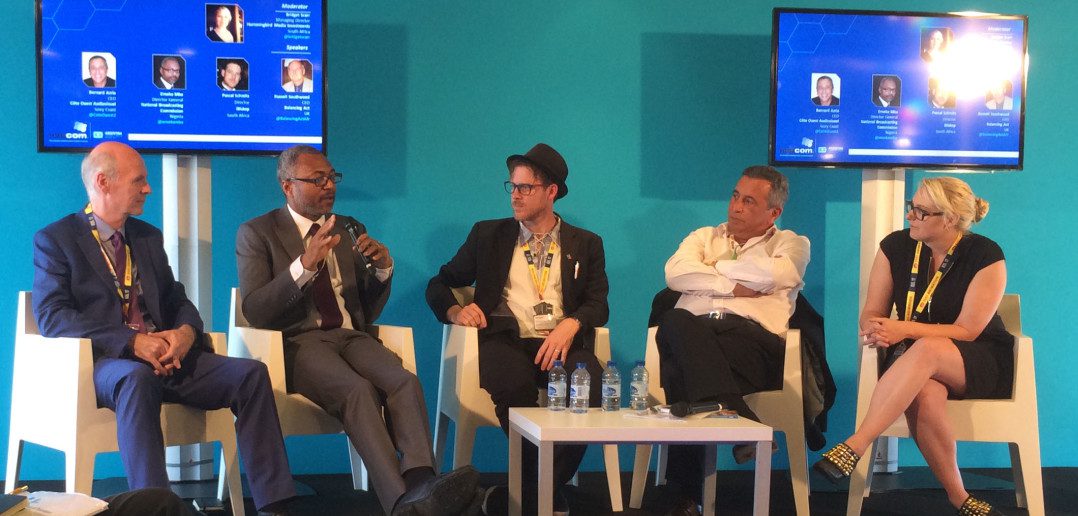The African television industry is in rude health, with rapid growth and lots of innovation from producers and broadcasters alike. A panel session at MIPCOM today explored current trends in the region, and what they mean for partners around the world.
The panel comprised: Russell Southwood, CEO of UK consultancy Balancing Act; Emeka Mba, director general of the National Broadcasting Commission in Nigeria; Pascal Schmitz, director of iBiskop in South Africa and Bernard Azria, CEO, Côte Ouest Audiovisuel in the Ivory Coast. It was moderated by Bridget Scarr, MD of Hummingbird Media Investments in South Africa.
Azria was first to speak, zooming out to the general mission of television. “In one word, it tells stories. Storytelling is the unique and sole proposal of our industry,” he said. “… In Africa, we have had so little occasion to tell our stories… For too long we have listened to others tell their stories, and even tell us our own stories!”
Azria noted that with around 500 local African channels all looking for content, there’s a big demand for locally-produced shows, and increasingly now the talent and production quality to match this demand across the continent. He also mischievously poked fun at the idea – voiced a lot at MIPCOM this week – that we’re in a golden age of American television.
“At a time when American writers seem to have exhausted their imagination, if I refer to the impressive number of remakes: Beverley Hills, Dallas, Melrose Place… at a time when Western production seems to be looking for new economic and creative models, I think we can truly realise that the new horizons Africa has to offer are more than promising… Africa can and must play a role, and it will.”
Southwood talked about the proliferation of media in Africa, particularly as countries move on from the notion of “Mr President TV“, where there is only one, state-controlled channel to watch. Kenya now has 18 TV stations, for example, while Tanzania has 20. But he pointed to the growth in mobile devices as the key trend for the coming years.
“I think that the continent will get mobile media and internet right in a way the rest of the world hasn’t quite managed to get its hands on, because mobile is the media people use,” he said, while adding that YouTube is growing fast in Africa.
Southwood noted that the boundaries are blurring between smartphones and so-called “feature phones” is blurring, with a growing number of handsets coming with a colour screen and some form of internet connection. That’s an opportunity for producers.
Next up was Emeka Mba, whose first point was that Africa is not one country: it’s many. “I have to get a visa to go to South Africa, and get a visa to go to Cameroon, and sometimes it’s much more difficult to get a visa to go to South Africa than it is to go to Europe,” he said. “You have got to understand that Africa is not one country. But Africa is changing because Africans want Africa to change. We realise that the time has passed when we expect help to come from outside.”
He continued: “If you’re looking at the fastest growth market in the world, it is in Africa. People will say there are challenges, but those challenges are opportunities, there’s no doubt about them, and you have to look at them from that point of view.”
Next up was Pascal Schmitz, an independent producer from South Africa who has also been exploring digital distribution opportunities with a service called iBiskop, on a platform called Go! Shop that distributes content to mobile devices using Bluetooth and Wi-Fi transmitters, to get around the problem of slow, expensive mobile internet. Its units are installed in taxi ranks and high-density commuter areas.
“We are obviously hopeful that this will launch us into a new area where we can get content to mobile phones,” he said. “Mobile phones have already overtaken PCs: we’ve jumped so Africa will go predominantly straight to mobile phones and tablets. This is were media will be consumed.”
Movies and feature-length documentaries cost the equivalent of $0.50 on iBiskop, while half-hour content costs around $0.20, and ‘super-shorts’ around $0.10. “That structure is based on the pirate prices,” he said, referring to physical piracy. “The idea is to evade piracy by beating the price… to keep it cheap and move volumes.”
Moderator Scarr talked trends, including the convergence of mobile and digital, a large move towards local niche content, the importance of young people, and the idea of television companies approaching Africa in clusters, rather than trying to target all 54 countries individually.
She also highlighted the growth of social media across the continent: “Nigeria doubles its Facebook population every three months, and Kenya is one of the top-three tweeting nations in the world,” she said.
The need for local content was a firm focus for the panel. “Definitely African content is king,” said Azria, but he warned that content doesn’t always travel well between countries, citing the famous Nollywood industry in Nigeria as an example.
“I think it’s very ethnocentric, and it doesn’t travel in my view. I think the productions that have been done so far in Senegal are also ethnocentric. And when I started to sell South African productions dubbed into French to the west part of Africa, or even in its English version, clients were saying ‘this South African show is South African! It’s not our Africa’,” he said.
“But now we are seeing some new kinds of productions which are a higher level of quality that can travel from one side of Africa to another side, but also travel outside Africa.”
Mba continued the theme, saying that “local is the future” and praising the growth in high-quality shows. He warned that quality isn’t always the first priority for viewers though. “The issue of quality is secondary: what is more important to the average African consumer is proximity,” he said. “Maybe Nollywood started it, but now Kenya and South Africa are starting to make the same kind of movies. If you are doing stuff for the local audience, it will sell.”




